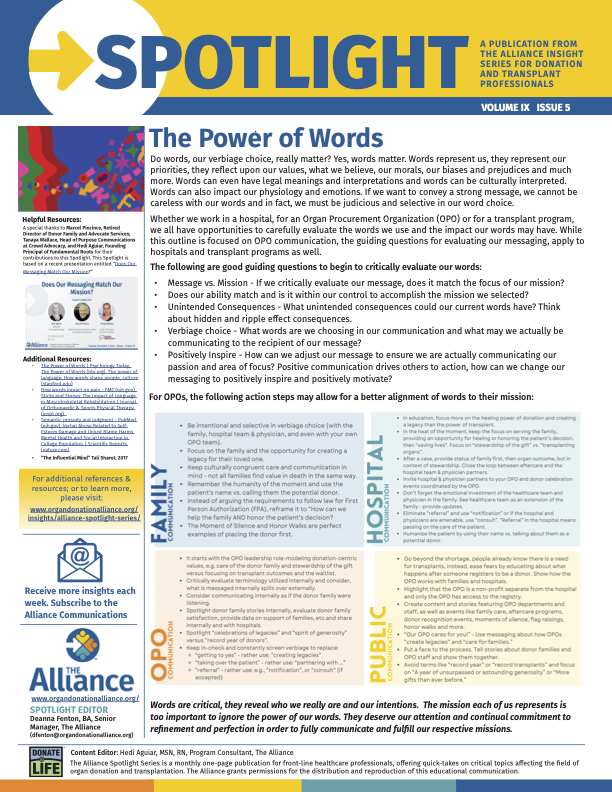Do words, our verbiage choice, really matter? Yes, words matter. Words represent us, they represent our priorities, they reflect upon our values, what we believe, our morals, our biases and prejudices and much more. Words can even have legal meanings and interpretations and words can be culturally interpreted (1). Words can also impact our physiology (2) and emotions (3). If we want to convey a strong message, we cannot be careless with our words and in fact, we must be judicious and selective in our word choice.
Whether we work in a hospital, for an Organ Procurement Organization (OPO) or for a transplant program, we all have opportunities to carefully evaluate the words we use and the impact our words may have. While this outline is focused on OPO communication, the guiding questions for evaluating our messaging, apply to hospitals and transplant programs as well.
Guiding Questions
The following are good guiding questions to begin to critically evaluate our words:
- Message vs. Mission – If we critically evaluate our message, does it match the focus of our mission? Does our ability match and is it within our control to accomplish the mission we selected?
- Unintended Consequences – What unintended consequences could our current words have? Think about hidden and ripple effect consequences.
- Verbiage choice – What words are we choosing in our communication and what may we actually be communicating to the recipient of our message?
- Positively Inspire – How can we adjust our message to ensure we are actually communicating our passion and area of focus? Positive communication drives others to action (4); how can we change our messaging to positively inspire and positively motivate?
Action Steps for OPOs
For OPOs, the following action steps may allow for a better alignment of words to their mission:
Communication with Families:
- Be intentional and selective in verbiage choice (with the family, hospital team & physician, and even with your own OPO team).
- Focus on the family and the opportunity for creating a legacy for their loved one.
- Keep culturally congruent care and communication in mind – not all families find value in death in the same way.
- Remember the humanity of the moment and use the patient’s name vs. calling them the potential donor.
- Instead of arguing the requirements to follow law for First Person Authorization (FPA), reframe it to “How can we help the family AND honor the patient’s decision?
- The Moment of Silence and Honor Walks are perfect examples of placing the donor first.
Communication with the Hospital Team & Physicians:
- In education, focus more on the healing power of donation and creating a legacy than the power of transplant.
- In the heat of the moment, keep the focus on serving the family, providing an opportunity for healing or honoring the patient’s decision, then “saving lives”. Focus on “stewardship of the gift” vs. “transplanting organs”.
- After a case, provide status of family first, then organ outcome, but in context of stewardship. Close the loop between aftercare and the hospital team & physician partners.
- Invite hospital & physician partners to your OPO and donor celebration events coordinated by the OPO.
- Don’t forget the emotional investment of the healthcare team and physician in the family. See healthcare team as an extension of the family – provide updates.
- Eliminate “referral” and use “notification” or if the hospital and physicians are amenable, use “consult”. (“Referral” in the hospital means passing on the care of the patient.)
- Humanize the patient by using their name vs. talking about them as a potential donor.
Communication within the OPO
- It starts with the OPO leadership role-modeling donation-centric values, e.g. care of the donor family and stewardship of the gift versus focusing on transplant outcomes and the waitlist.
- Critically evaluate terminology utilized internally and consider, what is messaged internally spills over externally.
- Consider communicating internally as if the donor family were listening.
- Spotlight donor family stories internally, evaluate donor family satisfaction, provide data on support of families, etc.and share internally and with hospitals.
- Spotlight “celebrations of legacies” and “spirit of generosity” versus “record year of donors”.
- Keep in-check and constantly screen verbiage to replace:
- “getting to yes” – rather use: ”creating legacies”
- “taking over the patient” – rather use: “partnering with …”
- “referral” – rather use: e.g., “notification”, or “consult” (if accepted)
Communication to the Public
- Go beyond the shortage, people already know there is a need for transplants, instead, ease fears by educating about what happens after someone registers to be a donor. Show how the OPO works with families and hospitals.
- Highlight that the OPO is a non-profit separate from the hospital and only the OPO has access to the registry.
- Create content and stories featuring OPO departments and staff, as well as events like family care, aftercare programs, donor recognition events, moments of silence, flag raisings, honor walks and more.
- “Our OPO cares for you!” – Use messaging about how OPOs “create legacies” and “care for families.”
- Put a face to the process. Tell stories about donor families and OPO staff and show them together.
- Avoid terms like “record year” or “record transplants” and focus on “A year of unsurpassed or astounding generosity” or “More gifts than ever before.”
Words are critical, they reveal who we really are and our intentions. The mission each of us represents is too important to ignore the power of our words. They deserve our attention and continual commitment to refinement and perfection in order to fully communicate and fulfill our respective missions.







